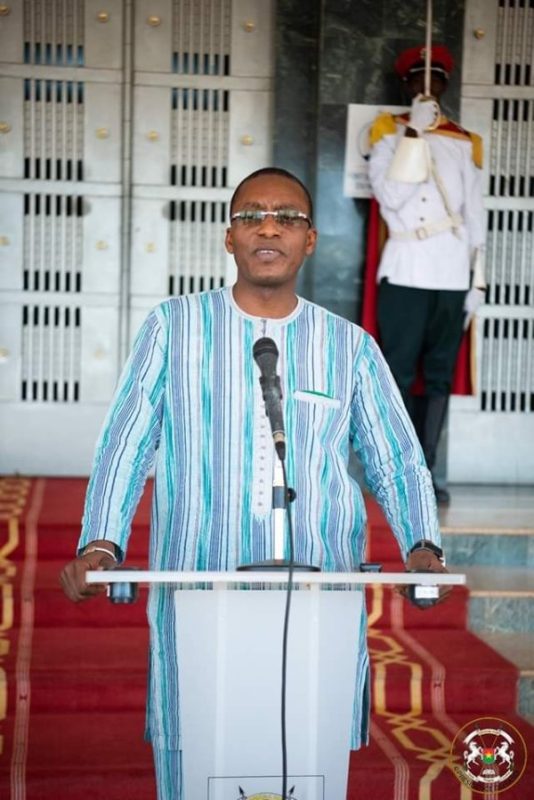• Objective, to relaunch production at the Comoé sugar company
• How much will the redemption of shares cost?
EIs this a return to nationalization for SN Sosuco? The question has been asked since the Minister of Commerce announced, following the Council of Ministers of October 25, 2023, that the State had decided to take back the shares sold in 1998 within the Comoé sugar company. .
Serge Poda, in front of journalists, after leaving the weekly Council of Ministers, maintained that the Burkinabè State had sold its shares with the aim of allowing the company, on the basis of the commitments made by the strategic actor, to invest over a period of 5 years for approximately 20 billion FCFA, in order to strengthen sugar cane and sugar production capacities on a national scale.
“From this observation and taking into account the very strategic role of SN-SOSUCO, the government decided to denounce the 1998 convention. This denunciation therefore opens operations in terms of resumption of State shares for the benefit of the State himself, so that this company once again becomes a state company,” indicated Minister Poda.
The agreement with Sucre Participation denounced
A strategic commodity, Burkina’s sugar has always benefited from strong investments. We owe the production to the Banfora complex, inaugurated in 1969, within which the Sugar Company of Upper Volta (SosuHV), which later became the Sugar Company of Comoé (Sosuco). It was to quickly reach 14,000 tonnes of lump sugar in 1972, against 5,000 tonnes in 1970 then 33,000 tonnes in 1977, after the extension of the plantations. The cost of the factory was 6.5 billion FCFA, 80% financed by international aid. This figure includes studies carried out since 1965, plantations and refineries.
Before the 1998 convention, the Burkinabe state held 77% of the company’s capital. The rest was distributed between several other operators in the sector, including Jean Vilgrain, the sugar factories of Nossy-Bé, the Sucreries marseillaises de Madagascar and the Raffineries de Saint-Louis.
Numerous loans from the European Investment Bank (EIB), granted within the framework of the Lomé Convention, made it possible to strengthen the productive capacity of the factory. Granted in October 1976, this financing aimed to make the country self-sufficient until 1985. Faced with management difficulties, the costs of production factors and competition from other countries, the company experienced great difficulties in 90s, and was unable to satisfy growing demand. The state has resigned itself to privatization.
Thus, from 1998, a consortium bringing together the Aga Khan Embelfaso Group and FC Schaffer was at the head of the company renamed Nouvelle Sosuco (SN Sosuco).
By denouncing the agreement with the largest shareholder of Sn Sosuco, the State is preparing to recover 52% of the shares held. And would thus become the majority shareholder of Sn Sosuco, with 80% of the company’s shares. For this operation, the IB government will have to find no less than 3 billion FCFA, just for the repurchase of the shares. Will the bill be higher if the denunciation is contested? Nothing is certain. For the government, the withdrawal of Sucre Participation’s shares comes from the fact that this actor did not respect the clauses of the contract. “The various commitments which conditioned the transfer of State shares to the strategic partner have not been respected,” warned the Minister of Commerce.
J.B.
Boxed
History of SN Sosuco
1965 : creation of the sugar study company (SE.SU.HV.) with participation from Burkina Faso, Ivory Coast and SOMDIIA. With a share capital of 1,000 million FCFA.
1968: Creation of the Upper Volta Sugar Company (SE.SU.HV), for the operation of a sugar complex.
1969: Start of the complex.
1972: Creation of sugar complexes by absorption of SE.SU.HV by SE.SU.HV with a share capital of 1,832,500,000 FCFA.
1973: Signature of the establishment agreement, increase in share capital to 1,965,600,000 F CFA.
1975: Inauguration of the sugar complex (share capital lent at 3,115,500,000 FCFA).
1984: Increase in capital to 6,031,050,000 FCFA and change of name of the company to Société Sucrière de la Comoé (SN.SO.SU.CO).
1998: Privatization of the Comoé Sugar Company, taken over by the IPS Group, with Burkinabe partners and FC Schaffer, under the name New Comoé Sugar Company (SN. SOSUCO).
Box 2
The capital which was 6,031,050,000 FCFA
IIt was distributed as follows in 1998:
Sucre Participation : 52% ;
Burkinabe state: 28%;
Ivorian State: 10.72%;
SOMDIA : 6.05% ;
and Burkinabe private individuals: 3.23%.
In 2016, the Ivorian government announced its intention to sell its 17,922 shares held in SN Sosuco. A competitive call for the purchase of the shares took place and no information was leaked on the possible buyers. o


